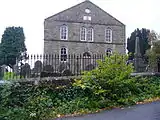| Gunnerside | |
|---|---|
 Gunnerside from the south side of the valley | |
.svg.png.webp) Gunnerside Location within North Yorkshire | |
| OS grid reference | SD951982 |
| • London | 210 mi (340 km) SE |
| Civil parish | |
| Unitary authority | |
| Ceremonial county | |
| Region | |
| Country | England |
| Sovereign state | United Kingdom |
| Post town | DARLINGTON |
| Postcode district | DL11 |
| Dialling code | 01748 |
| Police | North Yorkshire |
| Fire | North Yorkshire |
| Ambulance | Yorkshire |
| UK Parliament | |
Gunnerside is a village in North Yorkshire, England. It is situated in Swaledale, on the B6270 road, 3 miles (5 km) east of Muker and 6 miles (10 km) west of Grinton.[1][2] The village lies between the River Swale and its tributary, Gunnerside Beck, and is within the Yorkshire Dales National Park.
History
The name of the village derives from an Old Norse personal name Gunnar and sætr meaning hill or pasture.[3][4]
Gunnerside Ghyll (or Gunnerside Gill), a smaller valley running northwards, at right angles to the Swale valley (Swaledale), was the site of a major lead mining industry in Swaledale from the 17th century[5] to the late 19th century.[6] The beck that runs through the narrow valley, also called Gunnerside Gill, or Gunnerside Beck, rises between Rogan's Seat and Water Crag,[7] and runs for 5 miles (8 km) emptying into the River Swale at the site of Gunnerside New Bridge.[8] The bridge carries the B6270 over the River Swale south of the village; it was rebuilt several times during the 19th century due to flooding.[9] The current structure dates from around 1892 and is now grade II listed.[10]
The area attracts many ramblers who use the foot tracks for exploring the area. Some decide to visit The Old Working Smithy & Museum, established in 1795, for a modest admission fee.[11][12] The site contains historic items.
Gunnerside is served by a Methodist Chapel, a part-time post office, a weekly market, a restaurant and some shops selling food items. [13] The chapel was founded in 1789, but rebuilt in 1866.[14] The structure is now grade II listed.[15] A private building to the north of the crossroads in the village was the site of a Medieval corn mill, and in the early 20th century, a bus garage.[16] At the foot of Gunnerside Ghyll is the Kings Head public house.
The village primary school is one of two sites of the Reeth and Gunnerside Schools.[17] At the last Ofsted inspection in 2023, the primary school was rated as Good.[18]
Local employment centres on tourism,[19] clockmaking, hill farming, gamekeeping and construction, the latter concerned chiefly with the maintenance of traditional stone-built field walls, houses and field barns. The latter, also known as laithes, are typically referred to as "cow'uses" or cow houses in Swaledale.[20]
Notable people
- John Close, poet, was born in the village in 1816[21]
 Stone barns in the meadows near Gunnerside New Bridge
Stone barns in the meadows near Gunnerside New Bridge Methodist Chapel
Methodist Chapel Approaching Gunnerside
Approaching Gunnerside
See also
- Operation Gunnerside, which may have got its name because the participants trained on a moor near to Gunnerside owned by Charles Hambro.[22]
References
- ↑ "Descriptive Gazetteer Entry for Gunnerside". visionofbritain.org.uk. Retrieved 17 June 2021.
- ↑ "Genuki: In 1822, the following places were in the Parish of Grinton:, Yorkshire (North Riding)". www.genuki.org.uk. Retrieved 17 June 2021.
- ↑ Fleming, Andrew (1999). "3;Small-scale communities and the landscape of Swaledale". In Ucko, Peter; Layton, Robert (eds.). The archaeology and anthropology of landscape : shaping your landscape (1 ed.). London: Routledge. p. 69. ISBN 9780415117678.
- ↑ Ekwall, Eilert (1960). The concise Oxford dictionary of English place-names (4 ed.). Oxford: Clarendon Press. p. 399. ISBN 0-19-869103-3.
- ↑ "Gunnerside". The Express. 15 June 2021. Retrieved 25 October 2023.
- ↑ "Gunnerside Gill lead mines". www.outofoblivion.org.uk. Retrieved 17 June 2021.
- ↑ Speight 1897, p. 265.
- ↑ "Gunnerside Gill from Source to River Swale". environment.data.gov.uk. Retrieved 17 June 2021.
- ↑ Speight 1897, p. 253.
- ↑ Historic England. "Gunnerside New Bridge (Grade II) (1179749)". National Heritage List for England. Retrieved 17 June 2021.
- ↑ "The Old Working Smithy & Museum - Gunnerside". The Old Working Smithy. 1 June 2020. Retrieved 25 October 2023.
- ↑ "Gunnerside". Dales Discoveries. 15 June 2021. Retrieved 25 October 2023.
- ↑ "Local Food Shops and Producers near Gunnerside, North Yorkshire". Big Barn. 11 May 2022. Retrieved 25 October 2023.
- ↑ "Parishes: Grinton | British History Online". www.british-history.ac.uk. Retrieved 17 June 2021.
- ↑ Historic England. "Methodist Chapel (Grade II) (1130790)". National Heritage List for England. Retrieved 17 June 2021.
- ↑ "Gunnerside corn mill". www.outofoblivion.org.uk. Retrieved 17 June 2021.
- ↑ Philby, Charlotte (19 September 2009). "The lost villages of Britain: Can our rural communities survive in the 21st century?". The Independent. Retrieved 9 October 2017.
- ↑ "Gunnerside Methodist Primary School URN: 121542". reports.ofsted.gov.uk. Retrieved 25 October 2023.
- ↑ "Why You Should Visit Swaledale". Living North. 11 June 2021. Retrieved 26 October 2023.
- ↑ "Field barns and cow'uses". Dales Discoveries. 3 May 2019. Retrieved 25 October 2023.
Barns were used as a combination of cattle housing and fodder storage
- ↑ Brown, Douglas. "Close, John [called Poet Close]". Oxford Dictionary of National Biography (online ed.). Oxford University Press. doi:10.1093/ref:odnb/5704. (Subscription or UK public library membership required.)
- ↑ "Knut Haugland". The Telegraph. 28 December 2009. Retrieved 9 October 2017.